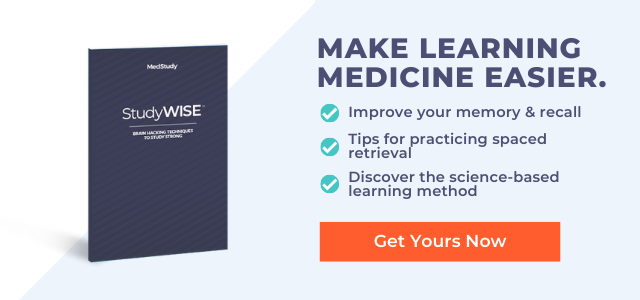Knowledge Retrieval—Make It Easier with the MedStudy Method

Have you ever thrown a ball or a stick to a Labrador Retriever? They never grow tired of this activity, do they? When it comes to learning, we’d do well to imitate these dogs’ love of the game of “fetch.”
Retrieval practice is reaching for information stored in your memory and “retrieving” it. It’s one of the most powerful study techniques you can use, improving performance by up to 50% over rereading alone. Retrieval practice reinforces your access to important information stored in your long-term memory. There are multiple ways to apply this technique, including:
- Previewing/assessment. Testing your knowledge of material before you study makes you search for and assess what you already know about a topic.
- Pondering/reflection. Thinking deeply about a topic forces you to consider the aspects that don’t yet make sense to you.
- Self-testing. Like previewing, self-testing with a short quiz, flashcards, or Q&As makes you search and assess your knowledge, but is generally performed after you have studied a topic.
MedStudy products are built to support the “retrieval game,” and below we describe how to use MedStudy resources for each type of retrieval practice.
PREVIEWING/ASSESSMENT
- Core Preview | Review. Ask yourself the questions before you study a section. Check the text afterward to see how close you came to the correct answers.
- Q&A Premium in Test Mode. Try to answer the question before you check the multiple-choice options. Then, select the single best answer. Read the correct answer and explanation afterward for self-correction and understanding.
- Flashcards. Think about everything in the scenario and generate your best answer. Read the flip side to check your accuracy.
- Core Audio Pearls. Write down from memory the most relevant information you know about a subspecialty. Then, listen to the recording for that section.
PONDERING/REFLECTION
- Core. Start with a question you want answered, then search the text until you understand.
- Q&A Premium in Study Mode. Think about the question and possible answers, then study the multiple-choice options and explanation.
- Onsite or Online Course. Complete the pre-course Practice Test and identify any knowledge gaps. Give special attention to these areas during each lecture.
- Video Board Review. Before you watch a lecture, preview the topic in your syllabus, jotting down notes in the form of questions you want answered. Watch for the answers in each lecture.
SELF-TESTING
Use a variety of self-testing techniques to make information more easily retrievable. Always self-correct after a testing session to make sure you understand the information.
- Write out everything you know about a topic.
- Draw a concept map.
- Use Flashcards.
- Use Q&A Premium in Test Mode.
You have an abundance of essential medical information already stored in your long-term memory. Play fetch with retrieval practice and you’ll strengthen your access to what you know!



